-
 Bitcoin
Bitcoin $117500
2.15% -
 Ethereum
Ethereum $3911
6.19% -
 XRP
XRP $3.316
10.79% -
 Tether USDt
Tether USDt $1.000
0.01% -
 BNB
BNB $787.2
2.24% -
 Solana
Solana $175.2
4.15% -
 USDC
USDC $0.9999
0.00% -
 Dogecoin
Dogecoin $0.2225
8.40% -
 TRON
TRON $0.3383
0.28% -
 Cardano
Cardano $0.7868
6.02% -
 Stellar
Stellar $0.4382
9.34% -
 Hyperliquid
Hyperliquid $40.92
7.56% -
 Sui
Sui $3.764
7.63% -
 Chainlink
Chainlink $18.48
10.66% -
 Bitcoin Cash
Bitcoin Cash $582.1
1.88% -
 Hedera
Hedera $0.2601
6.30% -
 Avalanche
Avalanche $23.33
4.94% -
 Ethena USDe
Ethena USDe $1.001
0.02% -
 Litecoin
Litecoin $122.3
2.04% -
 UNUS SED LEO
UNUS SED LEO $8.969
-0.27% -
 Toncoin
Toncoin $3.339
0.86% -
 Shiba Inu
Shiba Inu $0.00001287
4.30% -
 Uniswap
Uniswap $10.43
7.38% -
 Polkadot
Polkadot $3.861
5.08% -
 Dai
Dai $1.000
0.02% -
 Bitget Token
Bitget Token $4.513
3.41% -
 Monero
Monero $267.7
-6.18% -
 Cronos
Cronos $0.1499
4.14% -
 Pepe
Pepe $0.00001110
5.15% -
 Aave
Aave $284.9
8.28%
Is Litentry LIT currency a mainstream currency?
Litentry's unique focus on decentralized identity management, with use cases in identity verification, credential issuance, and data exchange, distinguishes it from mainstream cryptocurrencies like Bitcoin and Ethereum.
Dec 31, 2024 at 03:29 am

Litentry LIT Currency: A Deep Dive into Its Mainstream Potential
Key Points
- Definition and Functionality of Litentry
- Comparison with Other Mainstream Cryptocurrencies
- Adoption and Use Cases in the Industry
- Factors Influencing Mainstream Acceptance
- Exploring the Litentry Community and Development
- Potential Roadblocks and Challenges
- Conclusion: Litentry's Prospects as a Mainstream Currency
Definition and Functionality of Litentry
Litentry (LIT) is a decentralized identity network that empowers individuals and organizations to manage their digital identities securely. It uses a substrate-based blockchain to establish a reliable and scalable platform for identity verification, credential issuance, and data exchange. Litentry aims to bridge the gap between the digital world and the real world by providing a secure and efficient solution for identity management.
Comparison with Other Mainstream Cryptocurrencies
| Cryptocurrency | Rank | Main Features |
|---|---|---|
| Bitcoin (BTC) | 1 | Store of value, digital gold |
| Ethereum (ETH) | 2 | Smart contract platform |
| Tether (USDT) | 3 | Stablecoin pegged to the US dollar |
| Binance Coin (BNB) | 4 | Utility token for Binance ecosystem |
| Ripple (XRP) | 5 | Cross-border payments |
Litentry (LIT) differs from mainstream cryptocurrencies in its focus on decentralized identity solutions. While other cryptocurrencies excel in areas such as financial transactions, smart contracts, or payments, Litentry targets the specific niche of digital identity management.
Adoption and Use Cases in the Industry
Litentry has gained traction within the cryptocurrency industry due to its unique use cases and potential applications. It has been adopted by various projects and organizations, including:
- Celer Network uses Litentry for identity verification in its layer-2 scaling solution.
- Laminar Capital leverages Litentry's decentralized identity infrastructure for risk assessment and compliance.
- SubQuery integrates Litentry to enhance the security of its data indexing platform.
Factors Influencing Mainstream Acceptance
The mainstream acceptance of Litentry as a currency is influenced by several factors:
- Adoption: The broader adoption of Litentry's identity solutions by individuals and organizations will contribute to its mainstream acceptance.
- Integrations: Partnerships and integrations with major platforms and applications will increase Litentry's accessibility and visibility.
- Use Cases: The development and implementation of compelling use cases that demonstrate the value of Litentry's identity solutions will drive demand and adoption.
- Regulatory Framework: Clear and supportive regulations for decentralized identity solutions will provide stability and confidence to investors and users.
Exploring the Litentry Community and Development
Litentry has fostered a strong and engaged community. The LIT Foundation, a non-profit organization, leads the development and promotion of the Litentry ecosystem. The Litentry community actively participates in governance, proposal discussions, and project development.
Potential Roadblocks and Challenges
While Litentry has the potential to become a mainstream currency, it faces certain challenges:
- Competition: Other decentralized identity solutions, such as Civic, SelfKey, and Blox, are also gaining traction in the market.
- Scalability: As Litentry's network expands and adoption grows, it will need to address scalability issues to maintain efficient and reliable performance.
- Privacy Concerns: The use of identity data raises concerns about privacy and data security. Litentry will need to implement robust measures to protect users' personal information.
Conclusion: Litentry's Prospects as a Mainstream Currency
The mainstream acceptance of Litentry as a currency is dependent on a combination of factors, including adoption, use cases, regulatory support, and community engagement. While there are challenges to overcome, Litentry's innovative approach to decentralized identity management holds significant potential in the evolving cryptocurrency landscape.
FAQs
Q: Is Litentry similar to Ethereum?
A: Litentry focuses on decentralized identity solutions, while Ethereum is a smart contract platform. Both cryptocurrencies operate on blockchain technology, but their primary use cases differ.
Q: What are the benefits of using Litentry?
A: Litentry provides secure and efficient identity management, reducing fraud, enhancing data privacy, and enabling easier access to services online.
Q: Where can I purchase LIT?
A: LIT is available for purchase on major cryptocurrency exchanges, such as Binance, Huobi, and Coinbase.
Disclaimer:info@kdj.com
The information provided is not trading advice. kdj.com does not assume any responsibility for any investments made based on the information provided in this article. Cryptocurrencies are highly volatile and it is highly recommended that you invest with caution after thorough research!
If you believe that the content used on this website infringes your copyright, please contact us immediately (info@kdj.com) and we will delete it promptly.
- FTT Token's Wild Ride: Creditor Repayments vs. Market Drop - A New Yorker's Take
- 2025-08-08 07:10:12
- Floki Crypto Price Prediction: Riding the Robinhood Rocket or Just a Meme?
- 2025-08-08 07:15:12
- EigenLayer, Restaking, and Ethereum: Navigating the Hype and the Hazards
- 2025-08-08 06:30:12
- Super Bowl 59: Jon Batiste to Jazz Up the National Anthem
- 2025-08-08 06:30:12
- Cold Wallet Crypto in 2025: The Future is Now, Ya'll
- 2025-08-08 05:10:13
- MAGACOIN, SOL, and ADA: A Tale of Shifting Tides in Crypto
- 2025-08-08 05:10:13
Related knowledge

Where can I buy UMA (UMA)?
Aug 07,2025 at 06:42pm
Understanding UMA and Its Role in Decentralized FinanceUMA (Universal Market Access) is an Ethereum-based decentralized finance (DeFi) protocol design...

What exchanges support buying IOTA (MIOTA)?
Aug 07,2025 at 09:58pm
Understanding the Role of Private Keys in Cryptocurrency SecurityIn the world of cryptocurrency, private keys are the cornerstone of ownership and con...

How to acquire Holo (HOT) tokens?
Aug 08,2025 at 05:56am
Understanding Holo (HOT) and Its EcosystemHolo (HOT) is a cryptocurrency token associated with the Holo ecosystem, which is built on the Holochain fra...

What is the best app to buy EOS?
Aug 07,2025 at 04:35pm
Understanding EOS and Its Role in the Cryptocurrency EcosystemEOS is a blockchain platform designed to support decentralized applications (dApps) with...

What platforms support buying Fantom (FTM)?
Aug 08,2025 at 01:56am
Overview of Fantom (FTM) and Its EcosystemFantom (FTM) is a high-performance, scalable, and secure layer-1 blockchain designed to overcome the limitat...

How to invest in Aave (Aave)?
Aug 08,2025 at 01:07am
Understanding Aave (AAVE) and Its Role in DeFiAave is a decentralized finance (DeFi) protocol that enables users to lend, borrow, and earn interest on...

Where can I buy UMA (UMA)?
Aug 07,2025 at 06:42pm
Understanding UMA and Its Role in Decentralized FinanceUMA (Universal Market Access) is an Ethereum-based decentralized finance (DeFi) protocol design...

What exchanges support buying IOTA (MIOTA)?
Aug 07,2025 at 09:58pm
Understanding the Role of Private Keys in Cryptocurrency SecurityIn the world of cryptocurrency, private keys are the cornerstone of ownership and con...

How to acquire Holo (HOT) tokens?
Aug 08,2025 at 05:56am
Understanding Holo (HOT) and Its EcosystemHolo (HOT) is a cryptocurrency token associated with the Holo ecosystem, which is built on the Holochain fra...

What is the best app to buy EOS?
Aug 07,2025 at 04:35pm
Understanding EOS and Its Role in the Cryptocurrency EcosystemEOS is a blockchain platform designed to support decentralized applications (dApps) with...

What platforms support buying Fantom (FTM)?
Aug 08,2025 at 01:56am
Overview of Fantom (FTM) and Its EcosystemFantom (FTM) is a high-performance, scalable, and secure layer-1 blockchain designed to overcome the limitat...

How to invest in Aave (Aave)?
Aug 08,2025 at 01:07am
Understanding Aave (AAVE) and Its Role in DeFiAave is a decentralized finance (DeFi) protocol that enables users to lend, borrow, and earn interest on...
See all articles

























































































